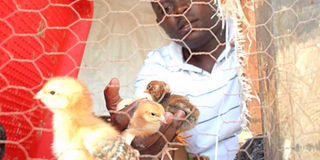VET ON CALL:Of magical milk jab and other fairy tales

Newton Florynda attends to his hatchery business in Migosi, Kisumu County. Mr Florynda is able to supply 5000 chicks per hatching cycle to farmers. PHOTO| ELIZABETH OJINA|NMG
What you need to know:
- Majority of licensed animal health service providers are honourable people and are unlikely to serve the farmer with self-interest.
- Always seek a second opinion when he doubts the advice given.
Today, I share some of the feedback and enquiries received from farmers.
I got a call on last week’s article regarding freemartinism in cattle. The caller, who identified himself as Leone, sounded excited.
With a chuckle, Leone said he was a paravet in Murang’a County and that the article saved his day.
“Doctor, imagine just yesterday I diagnosed a freemartin sale heifer and the farmer is hard on my case. He says I want to defraud him,” he said.
The details of Leone’s case were interesting. He had been contracted by a farmer for advice on dairy heifers and young cows to buy.
They were six high-quality cattle on a farm near his client’s.
Animal examination
Leone examined the heifers. The owner showered praises on one heifer, saying it looked stronger than the others though they were roughly the same age. He said he believed the heifer would give birth to twins as it was born a twin.
The mention of twins got Leone interested in that heifer. He had already noticed the heavy muscle build-up on the animal but had not examined it for breeding soundness.
Leone told me that when he raised the tail, the amount and length of hair on the vulva confirmed the muscle build-up was a result of freemartinism.
He asked Kamau, the farm owner, what had happened to the other calf born with the heifer. Kamau said he had sold it off as a calf since it was a bull.
When he told Kamau that his heifer was sterile and unfit for sale as breeding stock, the farmer accused Leone of attempting to defraud him of his heifer.
Kamau said he had never heard of such a condition in cattle.
He told Leone to give him time to consider what he had diagnosed.
Seeking a second opinion
The story got me thinking. My article had surely come in handy for the two protagonists. Leone requested me to call Kamau and explain to him his heifer’s predicament. Kamau patiently took in my explanation.
“You may therefore keep your heifer and try to breed it to prove its sterility or just sell it for slaughter,” I said.
Kamau laughed and asked me why human male-female twins have no problem.
I told him that in humans, twins have separate placentas and do not share blood. The female foetus does not get exposed to the male hormones as in the cow. Kamau was relieved, telling me he had earlier been convinced Leone wanted to slaughter the well-built heifer since the vet also runs a butchery.
The farmer added that he had noticed the calf was different from other females due to the muscles and heavy vulva hair.
He had assumed it was just individual variation, just like there are tall and short people from the same parents.
I told him that a majority of licensed animal health service providers are honourable people and are unlikely to serve the farmer with self-interest.
However, Kamau should always seek a second opinion when he doubts the advice given.
Leone later told me that Kamau agreed to sell the heifer for slaughter.
Interesting feedback
Another article with interesting feedback was the one on the “peeing chicken” in Ruiru that appeared in Seeds Of Gold on September 7.
Bonie, the farm manager, has been smiling as the birds keep increasing their daily egg production. Last week, he reported that the hens had attained 70 per cent production. Their egg-laying was 20 per cent when they were having frequent watery diarrhoea due to bacterial infection.
The gapeworm article on September 29, 2018 continues to raise questions from chicken farmers.
Last month, Odero from Kakamega called to say he had seen the worms in one of his free-range chickens and wanted to know what drugs to give the birds.
I asked him to explain how he had identified the worms. He said he had slaughtered a chicken that had kept its beak open for days and appeared to have difficulties in breathing. He reminded me I had explained how to look for the gapeworms in the wind pipe or trachea.
Though I was convinced he may have seen the worms, I advised Odero to seek advice from an animal health service provider.
When a vet attends to a sick animal, she should also advise the farmer on the other animals and the farm environment.
Lowering cost of production
A service provider who only attends to the sick animal is a liability to the farmer because she does not help the farmer to prevent diseases and therefore lower the cost of production.
Finally, there was Eseli from Vihiga who was convinced that there is an injection that can be given to cows to increase milk production in an instant.
I have heard that story many times, but nobody has ever told me its origin or the name of the product.
Callers always say they were told about the medicine by someone.
Eseli reminded me that I have written on production several times but I only talk about good feeding, water, management, diseases and good breeds.
I told him that the things I have talked about are the main parameters that determine milk yield.
I advise farmers to obtain livestock production information from reliable sources. There will always be claims of magical products but most are hoaxes.





